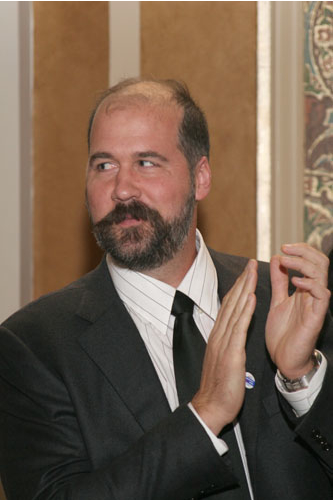The information revolution is creating new opportunities to make our lives better. It’s no stretch to think that someday we’ll be voting with our computers. Looking at the way Washingtonians currently nominate candidates for the presidential election, that day might come soon.The caucus system, though imperfect, holds significance as a grassroots mechanism for people to associate to amplify collective values. The Internet is already doing this with campaign phenomenon like Howard Dean in 2004, and this year with Ron Paul. If candidates rise by the power of the Internet, the leap to an actual nomination via computers is not out of the question.Caucuses can be exclusive for some folks. Some are overseas serving their country. People have religious convictions regarding certain days of the week. For others, work or transportation issues prohibit participation.Technology can help solve these issues. Let’s consider the emergence of Web-based voting. (I can already hear the gasps in front of the computer monitors out there, but hear me out.)Online elections are a growing business. Various independent companies offer secure, Web-based solutions for organizations needing to hold elections. Trade groups, condominium dwellers, medical societies, and other private associations are turning to this service. I don’t see how shopping for a service to hold elections is different from any other online purchase. There’s a good system of checks that works with Internet commerce. As you probably know, part of the value a buyer looks for is the rating given by others who have dealt with the seller.There are a lot concerns over the roles computers have in our elections. Most are legitimate, while some can be paranoid. I want to stress that I’m only talking about online elections within private organizations regarding nominations and not public general elections.But the technological revolution is advancing. It’s not unrealistic to think we’ll be electing our government online in the future. Of course, this needs to be done securely with people feeling comfortable. To start, an association could caucus and provide an online option for people who qualify with special needs.The Status QuoThe Republican and Democratic caucuses will be held on Feb. 9. If you’re a Democrat, this will be your opportunity to participate in the process to select delegates for your favorite candidate to the national convention in Denver. Republicans will select 49 percent of their delegates for St. Paul, Minn.Washington has traditionally held caucuses. In 1988, caucusing Democrats nominated Jesse Jackson, while the Republicans chose Pat Robertson. These results ran askew of the mainstream. Later in that same year, enough signatures were collected and an initiative for public nominations for major party candidates was sent to the Legislature, who approved it in 1989.Even though it’s state law, the major political party’s don’t have to abide by the results of the state-controlled primary. (Remember, they’re private organizations.) The Democrats never have used the results, while the Republicans have used the presidential primary how they desire.On Feb. 19, the state of Washington will conduct nominations on behalf of the political associations mentioned above. Zero percent of the delegates will be selected for Democrats, while 51 percent will be selected for Republicans.Essentially, the state-administered Democratic ballot will be a beauty contest.Republicans are touting how they’re saving the presidential primary with their 51 percent allocation of delegates. On their same Web page, there are links criticizing Gov. Gregoire for spending public money. Yet, the presidential primary, a state-funded and -administered program, will cost Washington taxpayers $9.7 million.In 2004, having no serious contest, Republicans withdrew their participation in the public presidential nomination program. This prompted Olympia to cancel the primary. If the Republicans are so concerned about state spending, considering they’re holding a privately funded caucus anyway, they should have called for the same in 2008.Compared to the rest of the world, voter turnout in the U.S.A. is lacking. Meaningless uncontested or uncompetitive elections depress participation. But there’s hope. Democracy is finding vitality online and transitioning well into the information revolution.
Why Our Caucuses Should Be Done Over the Internet
The political activist, and former bassist for Nirvana, blogs every week on the Daily Weekly.





